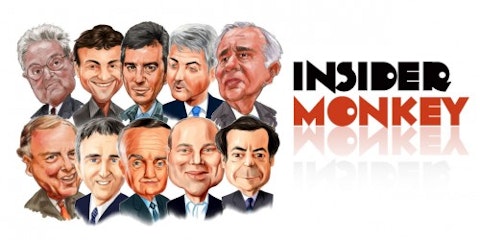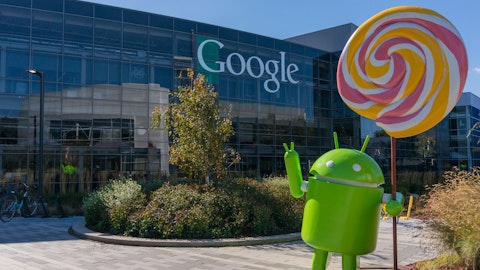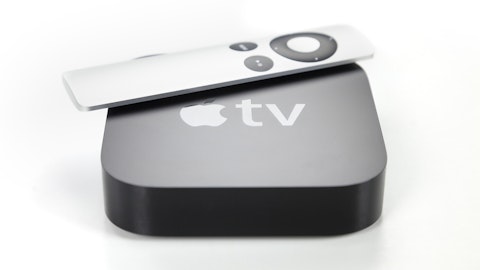At Insider Monkey we consider hedge fund sentiment regarding a stock to be very important, because piggybacking on hedge funds’ best ideas is probably one of the easiest ways to generate returns that can beat the market. That’s why each quarter we gather data from 13F filings of a pool of over 700 hedge funds and other large money managers and look at the stocks in which they invest. Generally, these investors prefer large- and mid-cap stocks, which is not surprising, taking into account that the total value of Assets Under Management for the hedge fund industry currently stands at around $2.70 trillion. However, choosing to invest in large-cap stocks is not a very lucrative idea, especially for smaller investors. The Credit Suisse Hedge Fund Index, which measures the performance of the hedge fund industry, has returned around 2.90% year-to-date, outperforming the S&P 500 by around one percentage point. With this in mind, we have compiled a list of the ten most popular stocks among the funds that we track, according to the latest round of 13F filings for the end of June.

However, even though these stocks ranked as the most popular, we think that a retail investor that aims to beat the market over the long-term should think twice before buying shares of these companies. Large- and mid-cap stocks usually are more efficiently priced due to their popularity, and, therefore, cannot provide high returns. However, there is another way to take advantage of hedge funds’ stock-picking skills without paying high fees and without engaging in a complex analysis of stocks. We determined that imitating the most popular small-cap ideas among the funds we track can beat the market by around one percentage point per month. Based on our backtests that involved hedge funds’ 13F portfolios between 1999 and 2012, we developed our small-cap strategy that consists of imitating a portfolio of 15 top small-cap picks among hedge funds and, since August 2012, this strategy returned around 118%, beating the S&P 500 ETF (SPY) by some 60 percentage points (read more details here).
Nevertheless, let’s take a closer look at the most popular stocks in which hedge funds invested their capital during the second quarter. On the first spot is Allergan PLC (NYSE:AGN), which was formerly known as Actavis. Actavis was the most popular stock at the end of March, as well, trumping Apple Inc. (NASDAQ:AAPL), which at the end of the second quarter was also on the second spot. Allergan PLC (NYSE:AGN) was included in the equity portfolios of 150 funds from our database at the end of June, while the aggregate value of their holdings amounted to $20.70 billion. In this way, hedge funds remained bullish on Allergan PLC (NYSE:AGN), as even though the number of investors with long positions declined from 157 at the end of March (for Actavis), they still hold around 17% of the company’s stock, which is a very high figure for a large-cap stock. And hedge funds are right to like Allergan. The stock has gained around 22% since the beginning of the year, and the company’s growth strategy based on making a number of significant acquisitions in the last years is building it towards being one of the leaders of the healthcare sector. The drug manufacturing industry is also one of the best performing, having returned 22% year-to-date. Among the 150 funds that disclosed long positions in Allergan in their latest 13F filings, the largest stakes were held by John Paulson’s Paulson & Co. and Andreas Halvorsen’s Viking Global, which held 7.17 million shares and 6.80 million shares respectively at the end of June. Other investors bullish on Allergan PLC (NYSE:AGN) include Daniel Och’s OZ Management, Stephen Mandel’s Lone Pine Capital, and Larry Robbins’ Glenview Capital.
On the second place, as stated earlier, is Apple Inc. (NASDAQ:AAPL), in which 142 funds held in aggregate $21.27 billion worth of stock, down from 150 investors holding $21.52 billion in stock a quarter earlier. Even though Apple is the second-most popular company in terms of the number of funds with long positions, the aggregate value of their stakes amounts to only 3% of the company’s common stock, which is a signal that on average, hedge funds are underweight Apple. There are reasons for that, because despite the stock’s appreciation and the company’s strong financial results, Apple Inc. (NASDAQ:AAPL) remains a one-product company, and the market’s reaction to weaker-than-expected iPhone sales shows that the company needs to address this issue. Nevertheless, Apple has many fans among big investors, such as Carl Icahn, who holds around 52.76 million shares as of June 30, and who has been saying for months that Apple is a “no-brainer” investment. Far behind Icahn, the second-largest shareholder of Apple Inc. (NASDAQ:AAPL) in our database is billionaire Ken Fisher’s Fisher Asset Management, which holds 11.01 million shares. On the other hand, Stephen Mandel’s Lone Pine Capital unloaded 6.84 million shares of Apple during the April – June period and closed its position.
Next in line is another tech stock, Facebook Inc (NASDAQ:FB), which maintained its ranking, but witnessed a slight increase in popularity, as the number of funds that own its shares went up to 133 from 129 during the second quarter. Moreover, amid just a 4% growth of the stock during this period, the aggregate value of investors’ positions surged to $8.86 billion from $7.09 billion. However, despite this jump, investors that we track hold only 3.7% of the company’s shares. Nevertheless, Facebook Inc (NASDAQ:FB)’s most recent financial results showed better-than-expected figures for most metrics, including the number of monthly active users (MAUs) and the number of mobile MAUs. In an environment where the online world is transitioning to mobile, Facebook has transitioned very well, with around 75% of its ad revenue coming from mobile now. Similar to the previous quarter, Lone Pine Capital remained the top shareholder of Facebook Inc (NASDAQ:FB) among the funds we follow and increased its stake by another 1.65 million shares over the quarter to 9.76 million shares. In addition, Ken Griffin’s Citadel Investment Group also boosted its holding by 3.23 million shares during the quarter to 5.07 million shares, while David E. Shaw’s D.E. Shaw sold 4.39 million shares, having disclosed ownership of 1.29 million shares in its latest 13F.
The financial sector is also present in the top five through Citigroup Inc (NYSE:C), in which 126 funds held $11.82 billion worth of stock, flat over the quarter. Among the major banks, Citigroup Inc (NYSE:C) is a good stock to hold, but investors probably still expect to see where it is headed as it plans to unload some of its unprofitable assets. The bank is currently trying to wind-down Citi Holdings, in which Citigroup has grouped its less profitable segments, such as retail brokerage, its life insurance unit, and toxic subprime loans. Nevertheless, most analysts have a bullish outlook on the stock, and the banking giant managed to score the cleanest results in the recent Fed stress test, which allowed it to increase dividends and buy back stock. In our database, Harris Associates and Boykin Curry‘s Eagle Capital Management are among the largest shareholders of Citigroup Inc (NYSE:C), owning 25.08 million shares and 24.37 million shares as of the end of June, respectively.
Finally, on the fifth spot is Delta Air Lines, Inc. (NYSE:DAL), which, in this way, is the most popular airline stock among hedge funds. At the end of June, 114 funds held $6.99 billion worth of stock, representing a 20% share of the company. However, Delta lost some popularity, since as of the end of the previous quarter, 116 investors disclosed stakes worth $7.15 billion. Meanwhile, Delta Air Lines, Inc. (NYSE:DAL)’s stock has depreciated by 3% year-to-date, though it managed to outperform the airline industry, which has lost 7% during the same period. The company’s recently taken a 3.55% stake in China Eastern Airlines, which is another good piece of news for investors, as the company is increasing its exposure to the Asian markets. Moreover, the investors that held the largest stakes in Delta Air Lines, Inc. (NYSE:DAL) at the end of March opted to increase their stakes during the second quarter amid an 8% decline of the stock. In this way, Lansdowne Partners, Iridian Asset Management, and PAR Capital Management added approximately 1.78 million shares, 2.27 million shares, and 1.11 million shares to their positions respectively, lifting their holdings to 26.55 million shares, 13.07 million shares, and 12.37 million shares as of the end of June, respectively.
Disclosure: None





